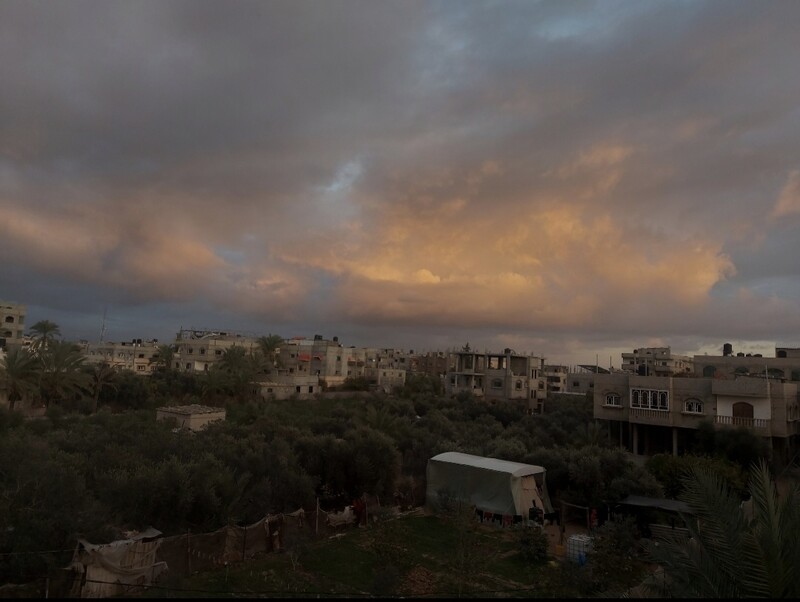The Electronic Intifada 23 May 2024

The orange orchard as seen from the author’s bedroom in Rafah in southern Gaza. The orchard was bombed by Israel on 24 April.
I heard an explosion around 8 pm coming from the orange orchard near my home in Rafah, southern Gaza. The orchard is so near that I can see it from my bedroom window.
The heat was suffocating that day and evening in late April. With no electricity, I cooled myself by lying down on the tile floor.
I was lying there on the bare floor when I heard the approaching “whoosh” sound of the Israeli attack. This was the closest that an explosion had ever gotten to our family home.
Adrenaline rushed through my body and I prepared for the next bombardment as gunpowder filled the entire house.
Such split seconds last for ages.
We were all home – my mother, my four sisters and my little brother – but my father was at the hospital, working.
Two days later, we would be forcibly displaced from Rafah to Egypt.
To Cairo
Staying in Gaza is a torment. Leaving Gaza is a torment.
At the Rafah crossing, the officials checked our papers and we got on the bus that was to take us to the Egyptian side of the border.
Baba (my father) was allowed on the bus to say goodbye to us. He wouldn’t be coming with us on this trip.
We all held in tears until Nour, my youngest sister, started crying. Then, we were all crying, even Baba.
I reassured Nour that Baba would join us soon.
We waited eight hours at the crossing, and the bus ride to Cairo took six hours. The next morning, the first thing we did was get Baba’s name on the approved travelers list.
The officials said that we would have to wait three weeks for approval. Three weeks until our reunion.
Now, since the beginning of May, three weeks has extended into who knows how long, as Israel seized control of the Rafah crossing and closed it.
We are now in a state of uncertainty as to when we will see Baba again.
Life outside of Gaza
On arriving to any place outside of Gaza, one realizes how meaningless time is in Gaza, as we are besieged both physically and temporally by Israel.
It is a complete shock when, after eight months of Israeli attacks, you arrive at a place that is full of life, that is quite normal.
The place we are staying in Cairo is close to the airport. Even this was an adjustment: going from a place where planes mean death to a place where air travel is just a part of daily life.
I still freeze, though, when I hear a plane in the sky, calculating the intensity and proximity of the next bombardment.
My entire family is finding it difficult to adjust to Egypt. After all, it is not our home.
My mom, especially, spent the first week in utter despair. She, too, cannot fathom the ugliness of Gaza’s reality now, as Israeli soldiers roam the streets and kill and evict us from our land.
On the phone with Baba in Rafah, when we can reach him, my words come out heavy. My mom complains about me not staying on the phone with him long enough, but words fail and suffocate me.
Though I do not fear sudden death as I did when we were home in Rafah, it is torture to witness this genocide from afar.
What strength can come from watching your people die of hunger? From mass graves and ruined hospitals?
Our lives are crushed under the weight of Israeli tanks. What is this beast that is gnawing at my people’s lives?
I am named after my grandmother Alia. My existence is a reflection of what I love and where I am from.
There is nothing more human than having a family and a place to call home.
I am a tale passed down from generation to generation. A mosaic of all the people and things that have touched my depths; I carry a piece of Gaza wherever I go.
Alia Khaled Madi is a writer from Gaza.




